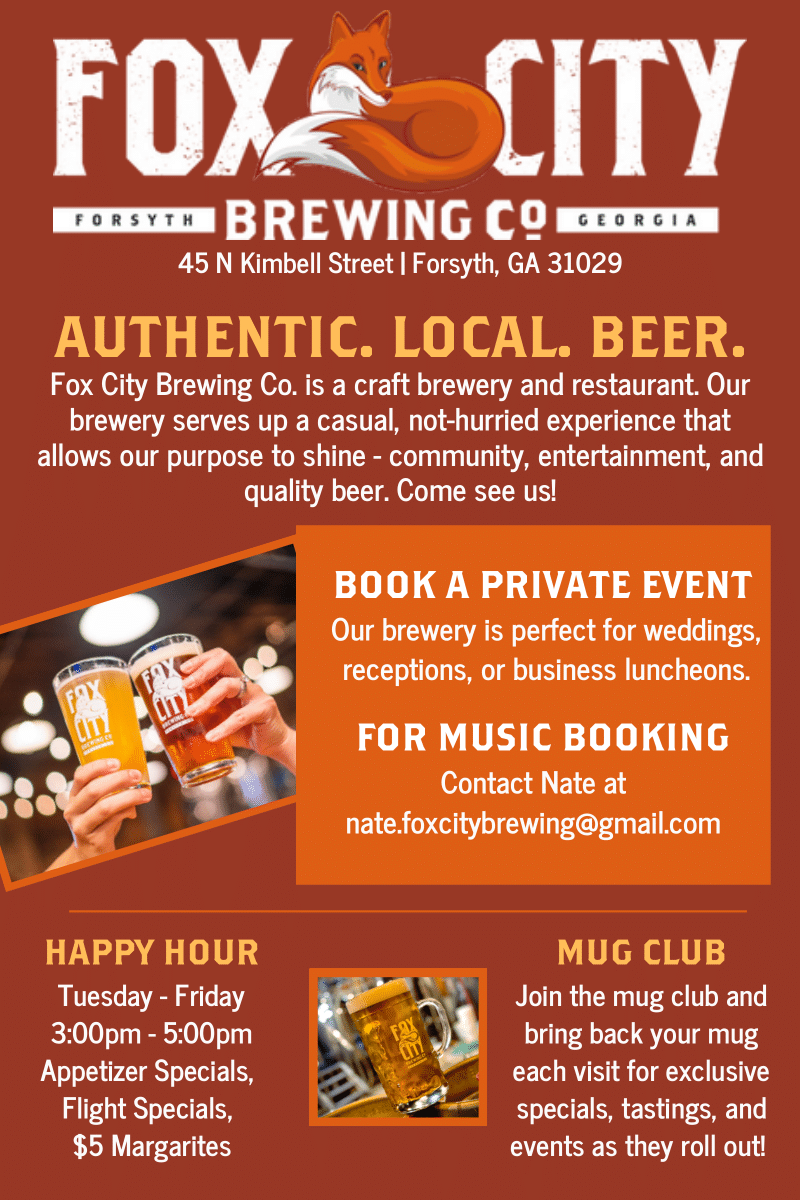I attended a meeting recently concerning the 1 million square foot warehouse development proposed for the north shore of High Falls Lake. I knew many of the people there, so I hugged necks, set up folding chairs and made my way to the back near the door. It’s hard to smile and say “good to see you” when this has become our primary reason for fellowship. A variance request to encroach within a state water buffer is what puts neighbors in a room together these days. In a way it feels like a funeral, but where is the celebration of life?
My family moved to Monroe County from Memphis when I was fourteen. It was the summer of 1993, before I started high school at Mary Persons, before Dan Pitts won 316 football games, before The Flood, before they tore down the Nancy, before Tift College was sold (the first time), before so many mile markers that only locals can really understand and that newcomers hear about incessantly. My father sold the move with promises of small-town life: Friday night lights, barbeques on the town square, and Fried Green Tomatoes. Like all the promises he made, these came true. The truth was so strong that despite trying to plant roots in Athens, Atlanta, Tampa, and even the wilds of Honduras, I always returned to Monroe County. My father died and my mother moved, but here I am. This time in High Falls. This time it’s different. Progress and development are trying to root, too. And why wouldn’t they? We are, after all, prime real estate on the Atlanta-Savannah corridor, smack dab between the I-16/I-75 junction and the busiest airport in the world. But like good southerners, we have kept an eye on our neighbors, Clayton, Henry, and now Lamar and Butts, as the arms of progress reach out from Atlanta, fingers splayed, south and east toward the Port of Savannah. A handshake or a grab? I believe the choice is still ours to make.
Industrial development is not all bad. How could we enjoy modern comforts without it? Manufacturing and distribution can still bring a significant number of jobs, though advances in AI will surely shrink those numbers in the future. Georgia courts new businesses with promises of Job Tax Credits when certain criteria are met, but according to the Georgia Department of Economic Development, those credits come with safeguards for the workers as well. To qualify, each job must have a minimum 35-hour work week, offer health insurance benefits consistent with what is offered to existing employees, and pay more than the average wage of the county with the lowest average wage in the state, among other requirements. There is a healthy level of give and take. Developers sometimes help with expansion of infrastructure, too, something the far-flung pieces of our county could benefit from. And even empty buildings bring property taxes to the counties where they sit, relieving some of the burden on residents.
But industrial development is not all good. More vehicles mean less air quality. Light and noise pollution are a concern. Fewer trees to take up storm water and more pavement to ease its movement can result in flooding, erosion, and polluted drinking water. There are potential leaks and spills. Our local treasures can be compromised like High Falls Lake, home to one of the most visited state parks in Georgia, which was put on the “impaired water” list by the Georgia Environmental Protection Division in 2022. And then there is Juliette.
Beyond environmental factors, consider the population boom, traffic nightmares, and overloaded infrastructure and schools that unfettered industrial growth brings. When population explodes, the middle ground between “sleepy little town” and “suburb of Atlanta” is by passed. Yes, we need industry to enjoy our lifestyle and the economic growth it brings, but at what cost? Our landscape? Our health? Our property values? Our community culture? Must we compromise these things? Can we protect not just our quality of life, but the heart of our community: its people, and still welcome progress at the same time? Will our local government be proactive or kick the can if enough eyes are averted? Too many questions? They never stop for me these days.
So now we, as a county, are faced with the daunting task of weaving new industry into the fabric of our community. It’s easy for our closest neighbors to the north. They reap the benefits, but the ill effects of their decisions run immediately to our roads and our waters. Only the smallest piece of their fabric lies across the progress thoroughfare: Interstate 75. Our fabric is completely bisected by it, top to bottom, we have more to lose to irresponsible development. Can we keep it from being torn completely apart?
After the meeting about the warehouse variance, I went to the High Falls Community Garden. Some friends and I started it in 2022 behind the new fire station on property that was once a hub of the community. It is a microcosm of progress: the restaurant is gone, but the new fire station offers improved emergency services, a community room, and the garden, which we planted to bring the community together. That night it did. Five of us showed up to tend the plants, but I think really to tend our souls. When I saw them walking around, watering, talking, I felt a piece of my own fabric mend. And still the reality of our future as a community whispered the question, can we tend the entire county the same way?









